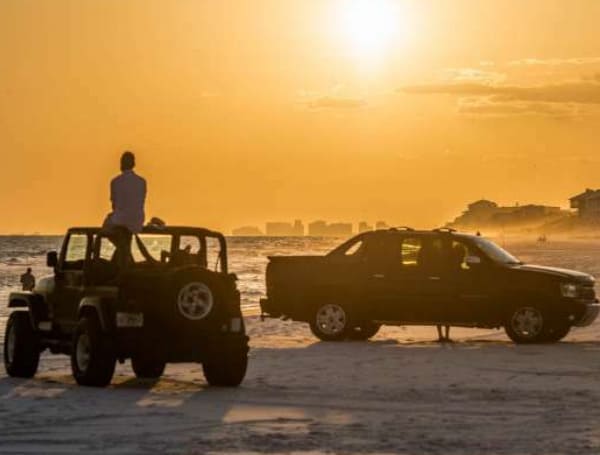Described by a judge as having “some of the world’s most beautiful beaches,” Walton County is embroiled in an appeals-court fight about a decision to close the beaches during the early days of the COVID-19 pandemic.
Beachfront homeowners are asking the 11th U.S. Circuit Court of Appeals to hear arguments in a case about whether the Northwest Florida county violated the property owners’ constitutional rights by preventing them from using privately-owned portions of the sand amid efforts to prevent the spread of the coronavirus.
In part, the homeowners contend that the county’s decision was an improper “taking” of property and that they should receive compensation.
“Beachfront property owners in Walton County purchase beachfront property because they want private beaches. This is the reason why beachfront properties tend to be the most sought-after parcels of land in any given jurisdiction, and particularly in Walton County,” attorneys for a group of property owners wrote in a brief filed last week at the Atlanta-based appeals court. “Taking private beaches away from beachfront-property owners annihilates the most pertinent reason why those property owners bought that property in the first place.”
In the news: Baycare, St. Anthony’s Hospital Sued For Negligence Resulting In Amputation
But Walton County is asking the appeals court to uphold a decision last year by U.S. District Judge Robert Hinkle, who said a temporary ordinance that kept people off the beaches was not a taking of property. Attorneys argued in a brief last month that county commissioners passed the ordinance because of concerns that people from COVID-19 “hotspots” would travel to Walton County early in the pandemic.
“The ordinance in question served the compelling interest in trying to prevent the spread of a dangerous and mysterious virus by attempting to deter others from traveling to Walton County,” the county’s May 19 brief said. “The county enacted the emergency ordinance to close its beaches to discourage the influx of persons leaving hotspots and traveling to the county. The ordinance was not about where people could best engage in essential activities while practicing social distancing, but rather an effort to curb the flow of people traveling to the county and contributing to the spread of the virus.”
Beach closures were a closely watched issue early in the pandemic, as images of crowds of beachgoers, including spring breakers, flashed across the country while the numbers of COVID-19 cases began to soar. Walton County, between Panama City and Destin, has seen a building boom in recent years, with multimillion-dollar homes popping up along its white-sand beaches.
The lawsuit focuses on people being unable to use areas of the beach that they own, rather than on beaches being closed to the general public. Under Florida law, privately owned beach property generally extends to a point known as the mean high-water line. Attorneys for the plaintiffs also have cited property owners’ “littoral” rights, which provide access to the water.
County commissioners passed the disputed ordinance on April 2, 2020, closing the beaches to all people, including the property owners, according to court documents. The closure lasted through April 2020.
In his ruling last year in favor of the county, Hinkle pointed, in part, to the temporary nature of the closure.
“The plaintiffs had full, unfettered, exclusive access to some of the world’s most beautiful beaches for 337 days during 2020. … That the plaintiffs’ access to part of their property was restricted for 29 days in an effort to safeguard the community was not an unconstitutional taking,” he wrote.
In their May brief at the appeals court, attorneys for the county also cited executive orders issued by Gov. Ron DeSantis to try to prevent the spread of the virus after it slammed into Florida in March 2020.
“Stripped of hyperbole, appellants (the property owners) challenge the authority of and manner in which the county chose to deal with a new and evolving public-health crisis,” the county’s brief said. “In context, the ordinance was enacted within a month of the governor’s declaration of the COVID-19 public health emergency, when he and other officials were struggling to come to grips with the risk and magnitude of this novel virus. Exercising its statutory emergency powers and keying off the governor’s series of increasingly restrictive executive orders, the Board of County Commissioners had the unenviable job of calling balls and strikes during a time of uncertainty.”
In the news: Florida Man Picks A Winner With $1,000,000 Scratch-Off Win After A WaWa Stop
But attorneys for the property owners, in the brief last week, disputed county arguments about the governor’s executive orders and that the ordinance was a “measured” response. In part, the brief cited DeSantis’ controversial refusal to shut down beaches statewide.
“Not one of the county’s stated or implicit premises is correct,” the property owners’ attorneys wrote. “Closing every inch of private-beach property along a 26-mile coastline cannot be considered ‘measured’ in any sense of the word.”
Visit Tampafp.com for Politics, Tampa Area Local News, Sports, and National Headlines. Support journalism by clicking here to our GiveSendGo or sign up for our free newsletter by clicking here.
Android Users, Click Here To Download The Free Press App And Never Miss A Story. Follow Us On Facebook Here Or Twitter Here.
Copyright 2022 The Free Press, LLC, tampafp.com. All rights reserved. This material may not be published, broadcast, rewritten, or redistributed.

